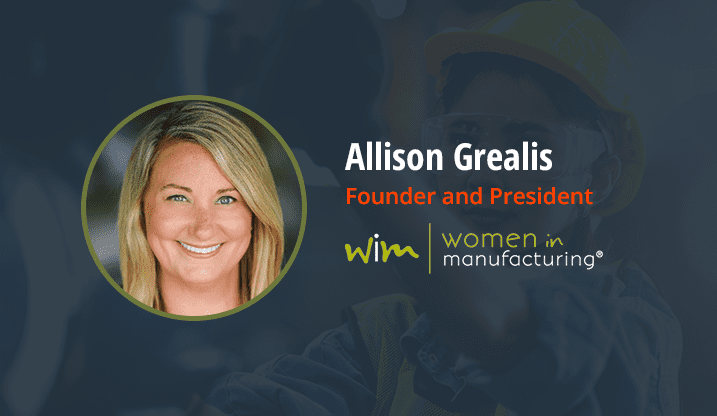Women and manufacturing have come a long way. Do you recognize the name Mary Bittorf? She was one of the first women in the workplace, and it was in a factory, making manufacturing one of the first industries to hire women in the United States in 1905.
And that brings us to Allison Grealis. Allison created a national manufacturing association dedicated to supporting women in the industry. While manufacturing has traditionally been a male-dominated industry, it’s Women’s History Month and we recently celebrated International Women’s Day. Let’s talk about women in the industry and why it’s important.
First, it’s always a good move to do anything that promotes diversity and inclusion. Why? Diversity and inclusion lead to more innovation and more creative work environments. Women bring different perspectives and experiences that lead to new ideas, products, and solutions, and that’s never a bad thing. Women in the industry are needed to break down stereotypes to inspire even more women to pursue manufacturing careers. A diverse workforce helps companies both attract and retain top talent.
According to the U.S. Census Bureau:
- Women make up about 47% of the total American workforce but only 30% of the manufacturing workforce.
- One out of four manufacturing management positions are held by women.
- Women in manufacturing earned on average 16% more than the national median annual income for women who are employed.
As I reflected on women in the workplace, and manufacturing in particular, I had the honor of sitting down with Allison Grealis, founder and president of the Women in Manufacturing® Association (WiM), a national trade association focused on supporting, promoting, and inspiring women in the manufacturing sector. Grealis is also the host of Hear Her Story, a monthly podcast celebrating the stories of women in manufacturing careers.
Taking the Road Less Travelled
Like all great stories, Allison’s started with a deviation from her original plan. Allison had intended to attend law school but quickly realized that her passion was improving lives and forming deep personal connections through her career. She was drawn to mission-driven organizations. Allison’s first job was with PIRG, a nonprofit organization focused on public interest in areas such as consumer protection, government, public health, waste and recycling, and clean water. This is when she really saw the importance of volunteering and giving back to the community.
Grealis earned a BA in English with a certificate in Women’s Studies from Ohio University and a master’s degree in Public Administration from the University of Akron. She went on to work with the trade association Precision Metalforming Association (PMA). She worked closely with small to mid-size business owners. This is when Allison got the opportunity to meet women rising to leadership within the industry. Many of the women she met shared with her the lack of support for women in manufacturing. After struggling to find any national or local associations dedicated to women in manufacturing, Allison, always ready to help, saw the void and stepped in to fill it. She began by creating virtual and social events, then took the leap with her first summit in Cleveland. The summit drew over 130 women from manufacturing. The event was a huge success, and she received requests for more of these events. And then WiM was born.
Our Conversation
I had the opportunity to sit down with Grealis and ask some questions about women in manufacturing and here’s what she had to say.
Question: What advice do you have for women considering a career in manufacturing?
Answer: My advice is to look at all the opportunities available in manufacturing. Do your research. There are so many positions and sectors to choose from. And financially, the manufacturing industry offers a higher average salary compared to non-manufacturing roles. Not only that, but manufacturing offers advancement opportunities and the chance to be involved in innovation and growth. Currently, we see more than 850,000 open positions nationally, so there are a ton of options and opportunities for women interested in the industry.
Question: What changes have you seen through the years in manufacturing?
Answer: There are so many. For example, we have seen more creative benefits and perks for employees, which is vital for attracting people to, and keeping them in, the industry. And of course, there’s so much new technology and smart changes with automation. In the last 5 years, we have seen more focus on culture as well. Unfortunately, something that has not changed is the difficulty surrounding recruiting talent.
Question: What are some of your goals for WiM?
Answer: To grow and strengthen our chapters. We currently have 32 chapters across the US and about 17,000 members. We have been going strong for 12 years. We want to grow our resources for our members and offer more support to leadership. WiM is always looking for ways to support our communities with recruiting, job boards, and opportunities to sponsor.
If you want to learn more about WiM (Women in Manufacturing) chapters, please contact Audrey Imes at aimes@womeninmfg.org.
The Omnia Group specializes in personality and cognitive assessments. An employee personality assessment doesn’t only help when you’re looking to fill a new role. The insights you’ll gain from our behavioral assessment can be used throughout the entire employee lifecycle. The Omnia Assessment can be used by industry leaders to effectively manage, motivate, and engage their teams. As the manufacturing industry tackles the problems surrounding recruiting and looks to create more people-centric cultures, the use of personality data is another tool in their arsenal.
Want to learn more about Omnia? Visit me at /jamie-morlock/























